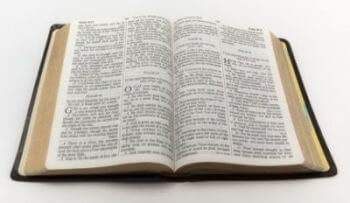 One of the joys – and slight frustrations – of the Bible is that it’s a remarkably dense work to read. Today’s first reading from the Acts of the Apostles begins with the flight of early persecuted Christians; a touching funeral for Stephen; Saul breaking into homes to drag out believers for imprisonment; and the powerful preaching of those fleeing Christians, which resulted in those who were possessed being freed, and those who were paralyzed and crippled being cured. The scene opens in bleak desperation, escalates to Saul’s reign of terror, and ends with “great joy in that city.” If this synopsis were mined for Hollywood screenplays, it would provide enough plot, action, pathos, and uplifting hope to fill out a two-film blockbuster series. And yet all this action and development takes place in a mere 140 words . . . a smaller word-count than contained in this paragraph.
One of the joys – and slight frustrations – of the Bible is that it’s a remarkably dense work to read. Today’s first reading from the Acts of the Apostles begins with the flight of early persecuted Christians; a touching funeral for Stephen; Saul breaking into homes to drag out believers for imprisonment; and the powerful preaching of those fleeing Christians, which resulted in those who were possessed being freed, and those who were paralyzed and crippled being cured. The scene opens in bleak desperation, escalates to Saul’s reign of terror, and ends with “great joy in that city.” If this synopsis were mined for Hollywood screenplays, it would provide enough plot, action, pathos, and uplifting hope to fill out a two-film blockbuster series. And yet all this action and development takes place in a mere 140 words . . . a smaller word-count than contained in this paragraph.
We live in an era where too many people assume that verbosity is equal to rightness. Politicians speak endlessly, repeating the same talking points over and over. Countless books come out every day, offering worldly cures and secular insight to fruitlessly fill the spiritual hole in our hearts. We all know at least one blowhard who pontificates for hours on end to anyone who’s willing to listen. (I’ve almost certainly been that blowhard at least once.) Too many people are willing to believe that more is more, and the world rewards them with an endless onslaught.
But the Bible is often concise, to the point of being a tad maddening to me at times. For example, the Gospel selection from John from two Sundays ago ends with this passage: “Now Jesus did many other signs in the presence of his disciples that are not written in this book.” For someone like me, raised in the world of “more is more,” I find myself saying, “Why didn’t they tell us about those ‘many other signs’?!”
But a moment’s thought realizes that it wouldn’t make any difference. Four different Gospels all reflect the miracles, prophecies, insight, and teachings of Christ; it’s highly unlikely that anyone would look at the totality of that evidence, along with centuries of documented Catholic miracles and insight, and say, “Gosh, I was on the fence about believing, and just a few more paragraphs would have pushed me over the edge . . .” For those whose hearts and minds are open to Christ, the evidence we have is ample; for those who have chosen not to believe, no amount of documentary evidence would satisfy.
The fact is, at some point, brevity has to suffice when talking about God. Today’s Psalm proclaims, “Let all on earth worship and sing praise to you, sing praise to your name!” It’s a short sentiment, but ample in its notion. All the Psalms are short, but no amount of text would be enough to justly sing the praises that God deserves. How can finite text sufficiently honor an infinitely wondrous God?
This tension between the fleetingly brief and the power of the infinite abounds in our faith. Today’s Gospel selection from John opens with Jesus saying, “I am the bread of life; whoever comes to me will never hunger, and whoever believes in me will never thirst.” In addition to the symbolic richness of its words, this is also a direct reference to the Eucharist – perhaps the perfect encapsulation of the span between the small and the infinite. A Communion wafer weighs less than half a gram, yet it is the real presence of Christ. In this case, the brevity of the bread encompasses the infinite. And this reality – so difficult to wrap our minds around – is one we can participate in daily, should we choose.
Perhaps, then, it is good to understand that God works through the smallest elements of creation. The briefest of Biblical passages, the tiniest sip of Communion wine, the faith of a mustard seed – all of these can bring us closer to God better than thousands of mass-market books, more richly than endless oration from self-appointed pundits. If you’re waiting for lightning from the sky to show you the way, perhaps instead you should also keep your senses open for the barest whisper of a breeze before a morning Mass, the slighest well-placed word from a trusted friend, that pang in your heart and mind when you reflect on some aspect of the faith. The world is verbose, but God often works through brevity . . . and – as God has shown time and again – there is power in brevity.
Today’s Readings for Mass: Acts 8:1B-8; Ps 66:1-3A, 4-5, 6-7A; Jn 6:35-40
